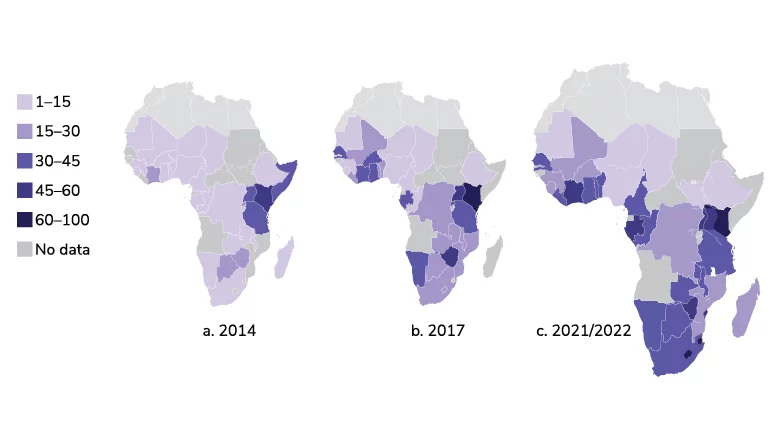Fintech
Mobile Money and FinTech Innovation in Sub-Saharan Africa

In sub-Saharan Africa, mobile money is now essential to promoting financial inclusion. Thanks to innovative mobile network operators in Kenya and elsewhere, East Africa used to be the hub of mobile money.
The availability of these services has expanded recently, to the point that by 2022 all 12 of the world’s economies will be located in sub-Saharan Africa, and there will be more adults with mobile money accounts there than with bank or other similarly regulated financial institution accounts.
In 2022, 28% of the adult population in sub-Saharan Africa had an average mobile money account. Although mobile money is not yet widely accepted in some economies, it is more of a minority than a common occurrence.

In 20 of the 36 economies studied, at least 30% of the population has mobile money accounts. Considering that 13% of people in emerging economies have mobile money accounts on average, this is even more impressive.
Reaching the unbanked population
The region’s economic landscape, which relies heavily on cash transactions in informal markets, has posed challenges for banking services to adapt. In 2022, more than two-thirds of payments by individuals in South Africa were made in cash, despite 85% of the population having a bank account. Meanwhile, additional challenges, including concerns about fraud, payment delays and relatively low financial literacy, are hindering the growth of banks across the region.
Mobile money is effectively addressing these issues. These services offer simplified procedures for getting started and logging in via Unstructured Supplementary Service Data (USSD), an encoded mobile communication protocol that relies on text messages rather than an Internet connection.
They are supported by 2G and 3G networks that serve over 80% of the population in the area. Major telecom companies are supporting the launch of mobile money services, offering greater security, convenience and instant transactions.
A push towards cashless transactions
Mobile money services have evolved from peer-to-peer (P2P) transactions to cash-in and out transactions, enabling the purchase of goods and services as demand grows and operators continue to innovate.
More unbanked people can rely on online mobile money transactions thanks to increased internet penetration and the introduction of affordable smartphones. This has led to a 29% increase in e-commerce value growth in Sub-Saharan Africa by 2022.
Mobile money opens up new avenues for understanding consumer trends and simplifying payments. B2B and B2C companies have used transaction analytics to improve customer experiences, develop targeted marketing strategies, and build brand loyalty.
Telecoms are driving growth, but fintech will become more important
Fintechs will become more significant, but telecom companies will likely continue to drive growth in consumer electronic payments. In Africa, mobile money has completely changed the way consumers shop.
By introducing cutting-edge payment solutions and other value-added services to their sizable customer base, telcos have played a significant role in driving the expansion of payments in Africa over the past decade through mobile money.
This pattern is expected to persist. Consumers have already moved from basic mobile money (Wallet 1.0), which primarily provided incoming and outgoing money and peer-to-peer (P2P) transfers, to Wallet 2.0, which offers more comprehensive financial services such as bill payments, savings, loans, and insurance.
Wallets 2.0 are starting to show signs of improvement, wallets 3.0 will be feature-rich wallets with access to services, in-app purchases, and connection to online retailers, marketplaces, and platforms as a payment option in addition to basic financial services.
Small Businesses Get a Boost from FinTech
An estimated 80-90 million SMEs in Africa still represent a huge unrealized potential in the payments industry. The recent growth in African payments has been largely attributed to FinTech innovation, merchant acquisitions, and related offerings.
Specialized FinTech consulting firms will be at the forefront of helping small and medium-sized businesses transition from traditional offline sales to online e-commerce, as reported by 37% of survey participants. The survey predicts that within three years, at least 25% of SMBs will have a digital footprint.
A driving force for FinTech innovation
Mobile money is becoming a driver of innovation as central banks lower barriers to entry into the financial sector, creating space for diverse revenue streams through new services such as insurtech and microcredit. Orange Bank Africa has used this opening to introduce nanocredit in Côte d’Ivoire.
By 2025, the company hopes to have provided these loans to 10 million customers in Senegal, Mali and Burkina Faso. In line with this, MTN partnered with Sanlam in 2022 to expand access to Ayo Insurance, a reasonably priced microinsurance program for the self-employed and informal workers in Ghana, Uganda and Zambia via mobile money services. By 2025, the strategic alliance hoped to reach 30 million users.
Adoption of mobile money poses consumer protection risks
Any initiative to increase financial inclusion through the use of digital connectivity and mobile money accounts should be complemented by initiatives to safeguard consumers. Digital skills are needed for digital financial services such as mobile money. These include the ability to manage passwords, activate digital wallets or accounts, transit user interfaces and use authentication systems.
Consumer concerns include lack of clarity about fees and other terms of service, aggressive marketing, inadequate dispute management, identity or data theft, mobile app fraud, and other dangers. These risks are not new; bank accounts already have them, but the accessibility and ease of use of mobile money have made them more significant.
For example, according to Global Findex 2021, a significant portion of account holders who had their paychecks deposited directly into their accounts faced unexpected fees. Of these adults, 5% in Cameroon reported having to pay surprise fees. We’re not sure if these were unofficial fees or if the user simply didn’t understand the charging schedule, but both scenarios suggest there may be room for abuse. Women may be more susceptible to unexpected fees and other types of exploitation since they often lack prior financial knowledge.
Conclusion
In Sub-Saharan Africa, supervisory agencies and financial regulators need to strengthen supervisory monitoring systems to detect and measure the many financial risks prevalent in the market, especially with the growing use of mobile money. It is equally critical to oblige providers to take action to ensure that mobile money users understand all product features and fee disclosures.
Fintech
US Agencies Request Information on Bank-Fintech Dealings

Federal banking regulators have issued a statement reminding banks of the potential risks associated with third-party arrangements to provide bank deposit products and services.
The agencies support responsible innovation and banks that engage in these arrangements in a safe and fair manner and in compliance with applicable law. While these arrangements may offer benefits, supervisory experience has identified a number of safety and soundness, compliance, and consumer concerns with the management of these arrangements. The statement details potential risks and provides examples of effective risk management practices for these arrangements. Additionally, the statement reminds banks of existing legal requirements, guidance, and related resources and provides insights that the agencies have gained through their oversight. The statement does not establish new supervisory expectations.
Separately, the agencies requested additional information on a broad range of arrangements between banks and fintechs, including for deposit, payment, and lending products and services. The agencies are seeking input on the nature and implications of arrangements between banks and fintechs and effective risk management practices.
The agencies are considering whether to take additional steps to ensure that banks effectively manage the risks associated with these different types of arrangements.
SUBSCRIBE TO THE NEWSLETTER
And get exclusive articles on the stock markets
Fintech
What changes in financial regulation have impacted the development of financial technology?

Exploring the complex landscape of global financial regulation, we gather insights from leading fintech leaders, including CEOs and finance experts. From the game-changing impact of PSD2 to the significant role of GDPR in data security, explore the four key regulatory changes that have reshaped fintech development, answering the question: “What changes in financial regulation have impacted fintech development?”
- PSD2 revolutionizes access to financial technology
- GDPR Improves Fintech Data Privacy
- Regulatory Sandboxes Drive Fintech Innovation
- GDPR Impacts Fintech Data Security
PSD2 revolutionizes access to financial technology
When it comes to regulatory impact on fintech development, nothing comes close to PSD2. This EU regulation has created a new level playing field for market players of all sizes, from fintech startups to established banks. It has had a ripple effect on other markets around the world, inspiring similar regulatory frameworks and driving global innovation in fintech.
The Payment Services Directive (PSD2), the EU law in force since 2018, has revolutionized the fintech industry by requiring banks to provide third-party payment providers (TPPs) with access to payment services and customer account information via open APIs. This has democratized access to financial data, fostering the development of personalized financial instruments and seamless payment solutions. Advanced security measures such as Strong Customer Authentication (SCA) have increased consumer trust, pushing both fintech companies and traditional banks to innovate and collaborate more effectively, resulting in a dynamic and consumer-friendly financial ecosystem.
The impact of PSD2 has extended beyond the EU, inspiring similar regulations around the world. Countries such as the UK, Australia and Canada have launched their own open banking initiatives, spurred by the benefits seen in the EU. PSD2 has highlighted the benefits of open banking, also prompting US financial institutions and fintech companies to explore similar initiatives voluntarily.
This has led to a global wave of fintech innovation, with financial institutions and fintech companies offering more integrated, personalized and secure services. The EU’s leadership in open banking through PSD2 has set a global standard, promoting regulatory harmonization and fostering an interconnected and innovative global financial ecosystem.
Looking ahead, the EU’s PSD3 proposals and Financial Data Access (FIDA) regulations promise to further advance open banking. PSD3 aims to refine and build on PSD2, with a focus on improving transaction security, fraud prevention, and integration between banks and TPPs. FIDA will expand data sharing beyond payment accounts to include areas such as insurance and investments, paving the way for more comprehensive financial products and services.
These developments are set to further enhance connectivity, efficiency and innovation in financial services, cementing open banking as a key component of the global financial infrastructure.
General Manager, Technology and Product Consultant Fintech, Insurtech, Miquido
GDPR Improves Fintech Data Privacy
Privacy and data protection have been taken to another level by the General Data Protection Regulation (GDPR), forcing fintech companies to tighten their data management. In compliance with the GDPR, organizations must ensure that personal data is processed fairly, transparently, and securely.
This has led to increased innovation in fintech towards technologies such as encryption and anonymization for data protection. GDPR was described as a top priority in the data protection strategies of 92% of US-based companies surveyed by PwC.
Financial Expert, Sterlinx Global
Regulatory Sandboxes Drive Fintech Innovation
Since the UK’s Financial Conduct Authority (FCA) pioneered sandbox regulatory frameworks in 2016 to enable fintech startups to explore new products and services, similar frameworks have been introduced in other countries.
This has reduced the “crippling effect on innovation” caused by a “one size fits all” regulatory approach, which would also require machines to be built to complete regulatory compliance before any testing. Successful applications within sandboxes give regulators the confidence to move forward and address gaps in laws, regulations, or supervisory approaches. This has led to widespread adoption of new technologies and business models and helped channel private sector dynamism, while keeping consumers protected and imposing appropriate regulatory requirements.
Co-founder, UK Linkology
GDPR Impacts Fintech Data Security
A big change in financial regulations that has had a real impact on fintech is the 2018 EU General Data Protection Regulation (GDPR). I have seen how GDPR has pushed us to focus more on user privacy and data security.
GDPR means we have to handle personal data much more carefully. At Leverage, we have had to step up our game to meet these new rules. We have improved our data encryption and started doing regular security audits. It was a little tricky at first, but it has made our systems much more secure.
For example, we’ve added features that give users more control over their data, like simple consent tools and clear privacy notices. These changes have helped us comply with GDPR and made our customers feel more confident in how we handle their information.
I believe that GDPR has made fintech companies, including us at Leverage, more transparent and secure. It has helped build trust with our users, showing them that we take data protection seriously.
CEO & Co-Founder, Leverage Planning
Related Articles
Fintech
M2P Fintech About to Raise $80M

Application Programming Interface (API) Infrastructure Platform M2P Financial Technology has reached the final round to raise $80 million, at a valuation of $900 million.
Specifically, M2P Fintech, formerly known as Yap, is closing a new funding round involving new and existing investors, according to entrackr.com. The India-based company, which last raised funding two and a half years ago, previously secured $56 million in a round led by Insight Partners, earning a post-money valuation of $650 million.
A source indicated that M2P Fintech is ready to raise $80 million in this new funding round, led by a new investor. Existing backers, including Insight Partners, are also expected to participate. The new funding is expected to go toward enhancing the company’s technology infrastructure and driving growth in domestic and international markets.
What does M2P Fintech do?
M2P Fintech’s API platform enables businesses to provide branded financial services through partnerships with fintech companies while maintaining regulatory compliance. In addition to its operations in India, the company is active in Nepal, UAE, Australia, New Zealand, Philippines, Bahrain, Egypt, and many other countries.
Another source revealed that M2P Fintech’s valuation in this funding round is expected to be between USD 880 million and USD 900 million (post-money). The company has reportedly received a term sheet and the deal is expected to be publicly announced soon. The Tiger Global-backed company has acquired six companies to date, including Goals101, Syntizen, and BSG ITSOFT, to enhance its service offerings.
According to TheKredible, Beenext is the company’s largest shareholder with over 13% ownership, while the co-founders collectively own 34% of the company. Although M2P Fintech has yet to release its FY24 financials, it has reported a significant increase in operating revenue. However, this growth has also been accompanied by a substantial increase in losses.
Fintech
Scottish financial technology firm Aveni secures £11m to expand AI offering

By Gloria Methri
Today
- To come
- Aveni Assistance
- Aveni Detection
Artificial intelligence Financial Technology Aveni has announced one of the largest Series A investments in a Scottish company this year, amounting to £11 million. The investment is led by Puma Private Equity with participation from Par Equity, Lloyds Banking Group and Nationwide.
Aveni combines AI expertise with extensive financial services experience to create large language models (LLMs) and AI products designed specifically for the financial services industry. It is trusted by some of the UK’s leading financial services firms. It has seen significant business growth over the past two years through its conformity and productivity solutions, Aveni Detect and Aveni Assist.
This investment will enable Aveni to build on the success of its existing products, further consolidate its presence in the sector and introduce advanced technologies through FinLLM, a large-scale language model specifically for financial services.
FinLLM is being developed in partnership with new investors Lloyds Banking Group and Nationwide. It is a large, industry-aligned language model that aims to set the standard for transparent, responsible and ethical adoption of generative AI in UK financial services.
Following the investment, the team developing the FinLLM will be based at the Edinburgh Futures Institute, in a state-of-the-art facility.
Joseph Twigg, CEO of Aveniexplained, “The financial services industry doesn’t need AI models that can quote Shakespeare; it needs AI models that deliver transparency, trust, and most importantly, fairness. The way to achieve this is to develop small, highly tuned language models, trained on financial services data, and reviewed by financial services experts for specific financial services use cases. Generative AI is the most significant technological evolution of our generation, and we are in the early stages of adoption. This represents a significant opportunity for Aveni and our partners. The goal with FinLLM is to set a new standard for the controlled, responsible, and ethical adoption of generative AI, outperforming all other generic models in our select financial services use cases.”
Previous Article
Network International and Biz2X Sign Partnership for SME Financing
IBSi Daily News Analysis

SMBs Leverage Cloud to Gain Competitive Advantage, Study Shows
IBSi FinTech Magazine

- The Most Trusted FinTech Magazine Since 1991
- Digital monthly issue
- Over 60 pages of research, analysis, interviews, opinions and rankings
- Global coverage
subscribe now
-

 DeFi12 months ago
DeFi12 months agoDeFi Technologies Appoints Andrew Forson to Board of Directors
-

 Fintech12 months ago
Fintech12 months agoUS Agencies Request Information on Bank-Fintech Dealings
-

 News1 year ago
News1 year agoBlock Investors Need More to Assess Crypto Unit’s Earnings Potential, Analysts Say — TradingView News
-

 DeFi12 months ago
DeFi12 months agoSwitchboard Revolutionizes DeFi with New Oracle Aggregator
-

 DeFi12 months ago
DeFi12 months agoIs Zypto Wallet a Reliable Choice for DeFi Users?
-

 News1 year ago
News1 year agoBitcoin and Technology Correlation Collapses Due to Excess Supply
-

 Fintech12 months ago
Fintech12 months agoWhat changes in financial regulation have impacted the development of financial technology?
-

 Fintech12 months ago
Fintech12 months agoScottish financial technology firm Aveni secures £11m to expand AI offering
-

 Fintech12 months ago
Fintech12 months agoScottish financial technology firm Aveni raises £11m to develop custom AI model for financial services
-

 News1 year ago
News1 year agoValueZone launches new tools to maximize earnings during the ongoing crypto summer
-

 Videos5 months ago
Videos5 months ago“Artificial intelligence is bringing us to a future that we may not survive” – Sco to Whitney Webb’s Waorting!
-

 DeFi1 year ago
DeFi1 year agoTON Network Surpasses $200M TVL, Boosted by Open League and DeFi Growth ⋆ ZyCrypto













